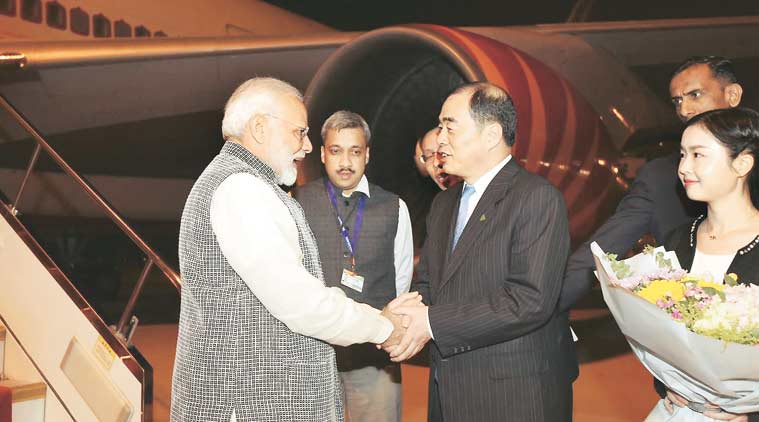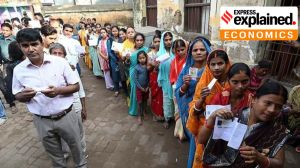Past midnight Thursday, as Prime Minister Narendra Modi landed in this picturesque city of lakes, parks and gardens along the Yangtze river, the big question that followed him was this: Can he bridge the trust deficit with China, and its powerful President Xi Jinping?

“The modus vivendi, which was reaffirmed and arrived at during (then PM) Rajiv Gandhi’s 1988 visit, has frayed considerably. It has been felt on both sides that it needs to be reframed,” sources told The Indian Express.
Officials feel the 1988 framework to develop bilateral relations in all spheres, while carrying out border negotiations without any use of force, has outlived its utility.
Read | All set for reset, PM Narendra Modi and China’s Xi Jinping to hold informal meet this week
“China has now emerged as a hegemonic power and has been stepping on our toes repeatedly. We are competing with each other everywhere, from South Asia to Africa, from Southeast Asia to Indo-Pacific. There is a realisation that both sides have reached a tipping point,” sources said.
The Chinese President has not hosted any leader in an “informal summit”, which is how the Xi-Modi meeting has been described. In fact, Xi is travelling out of Beijing to central China to spend over two days with the Indian PM, the first time he is extending such a gesture to a visiting foreign leader.
Story continues below this ad
 Prime Minister Modi arrives in Wuhan. (PMO/Twitter)
Prime Minister Modi arrives in Wuhan. (PMO/Twitter)
The two leaders have met at least 10 times over the last four years, but this will be their first meeting since Xi has been re-elected, with the Constitutional limit for a presidential term done away with.
“There has been a lack of strategic trust between the two countries, and this summit will be looking at repairing that damage and how to move forward,” sources said.
“Wuhan was recently named China’s happiest city…we hope to give some happy news about the summit,” a Chinese official told The Indian Express.
Read | Indian PMs in China: How history and future frame India-China relationship
Story continues below this ad
Modi will meet Xi at about 3 pm Friday at the Hubei provincial museum. The two leaders will head for a one-on-one meeting at the premises and also tour the museum together.
Later, a structured meeting between Modi and Xi, with six officials on each side, will be held at the museum premises. The two sides will then move to the State Guest House, a palatial complex in the heart of the city along the East lake, where the leaders will meet once again accompanied by the officials. Modi and Xi will again meet for dinner at the guest house Friday evening.
This structured delegation-level talks is the first indication that the “informal summit” is being crafted in a calibrated and choreographed manner.
Read | No pacts, Modi, Xi to have ‘heart-to-heart’ talks to build trust; India maintains position on BRI
Story continues below this ad
Some of Friday’s meetings will be attended by senior officials, including National Security Advisor Ajit Doval and Foreign Secretary Vijay Gokhale. But Saturday will see the two leaders meeting mostly in a one-on-one format, including a “lakeside walk” and a “boat-ride”. The leaders will also travel on a ferry, where they will “discuss issues over a cup of tea”.
Ahead of his departure for Wuhan, Modi said, “President Xi and I will exchange views on a range of issues of bilateral and global importance. We will discuss our respective visions and priorities for national development, particularly in the context of the current and future international situation. We will also review developments in India-China relations from a strategic and long-term perspective.”
Sources said the talks will not be on “specific issues” but “the future direction of the relationship”, including concerns and sensitivities such as the China-Pakistan-Economic Corridor, Belt and Road Initiative, listing of Masood Azhar and India’s membership in the Nuclear Suppliers Group. From the Chinese perspective, the Tibetan issue and how India handles the refugees are key questions.
Preparatory work on the new arrangement has been taking place since last September, when the two leaders met in Xiamen on the sidelines of the BRICS summit and wanted to talk “in detail”, but could not due to paucity of time.
Story continues below this ad
In Wuhan, Modi was received by Chinese Vice Foreign minister Kong Xuanyou at the airport.
Indicating the mood within the Chinese leadership, a commentary published in China Daily, a media outlet run by the ruling Communist Party of China, carried the headline: “Summit may herald Century of Asia”.
In the piece, Fu Xiaoqiang, research fellow at the China Institute of Contemporary International Relations, wrote: “Of course, Xi and Modi will also address each other’s concerns, but they are not likely to indulge in strategic distrust and geopolitical competition by ignoring the necessity of strengthening win-win cooperation.”
Incidentally, a part of the Wuhan State Guest House complex houses Mao Zedong’s summer villa by the lake side, which is now open to visitors. Wuhan, the capital of Hubei province, has also hosted Nobel Laureate Rabindranath Tagore during his tour of China 94 years ago to engage with writers, poets and intellectuals.

 Prime Minister Narendra Modi and Chinese President Xi Jinping during last year’s BRICS Summit in Xiamen. (File)
Prime Minister Narendra Modi and Chinese President Xi Jinping during last year’s BRICS Summit in Xiamen. (File)
 Prime Minister Modi arrives in Wuhan. (PMO/Twitter)
Prime Minister Modi arrives in Wuhan. (PMO/Twitter)





